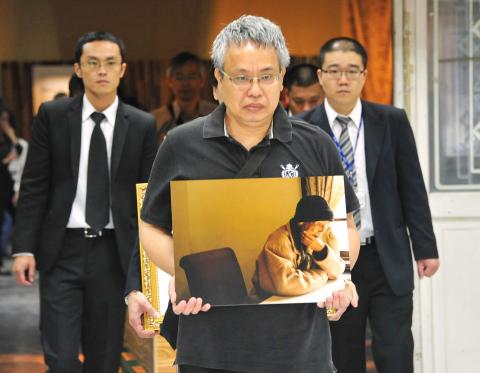Prominent cultural figures and friends gathered yesterday for the funeral of poet Chou Meng-tieh (周夢蝶) in Taipei, where they recalled the life of the meditative poet and celebrated the man and his beautiful creations.
Chou died on May 1 at age 92 due to complications from pneumonia.
Those who came to pay their respects placed a flower inside the poet’s casket. Admirers and people close to him spoke about Chou’s contributions to literature.

Photo: Pan Shao-tang, Taipei Times
Poet Hsiang Ming (向明) dedicated a poem to his longtime friend, recalling Chou’s bright eyes that “never lost focus” despite the passage of time.
“He chose to be a poet after having been through war. He not only wrote poetry — his life was a poem itself,” writer Chang Show-foong (張曉風) said.
Also in attendance was Culture Minister Lung Ying-tai (龍應台), who praised the late poet for his personality as well as his works.
“His poetry, character and perseverance are like a national flag for Taiwan — a flag that represents beauty and pureness, and depth of heart,” Lung said.
Presidential Office Secretary-General Timothy Yang (楊進添) presented a posthumous presidential citation for Chou to the late poet’s friend Tseng Chin-feng (曾進豐).
The citation called Chou an “undying legend” of Taiwan’s cultural history, praising his works for capturing the essence of Zen Buddhism and enriching contemporary Chinese poetry.
Chou was born Chou Chi-shu (周起述) in China’s Henan Province in 1921.
He joined the Chinese Nationalist Party’s (KMT) China Youth Corps during the Chinese Civil War and came to Taiwan in 1948 with the party, leaving behind his wife, children and mother.
He began selling poetry and books in Taipei in 1959, the same year he published his first collection of poems, Gu Du Guo (“Lonely Land”), which became one of his most important works.
In 1997 he was named the first literature laureate of the National Culture and Arts Foundation.
His poems are deeply influenced by Buddhist thought and have a meditative quality. They often touch on subjects of time, life and death.
Chou wrote more than 400 poems, which have been published in Taiwan and overseas, including in China, the US, France and South Korea.
He was known for living a simple and low-key life. He never remarried and had no relatives in Taiwan.

A strong continental cold air mass is to bring pollutants to Taiwan from tomorrow, the Ministry of Environment said today, as it issued an “orange” air quality alert for most of the country. All of Taiwan except for Hualien and Taitung counties is to be under an “orange” air quality alert tomorrow, indicating air quality that is unhealthy for sensitive groups. In China, areas from Shandong to Shanghai have been enveloped in haze since Saturday, the ministry said in a news release. Yesterday, hourly concentrations of PM2.5 in these areas ranged from 65 to 160 micrograms per cubic meter (mg/m³), and pollutants were

Taiwan’s armed forces have established response protocols for a wide range of sudden contingencies, including the “Wan Chun Plan” to protect the head of state, the Ministry of Defense (MND) said today. After US President Donald Trump on Saturday launched a series of airstrikes in Venezuela and kidnapped Venezuelan President Nicolas Maduro, concerns have been raised as to whether China would launch a similar “decapitation strike” on Taiwan. The armed forces regularly coordinate with relevant agencies and practice drills to ensure preparedness for a wide range of scenarios, Vice Minister of National Defense Hsu Szu-chien (徐斯儉) told reporters before a

EVA Airways on Saturday said that it had suspended a pilot and opened an investigation after he allegedly lost his temper and punched the first officer several times as their plane was taxiing before takeoff at Los Angeles International Airport. According to a report published on Thursday by The Reporter, the incident occurred after the flight’s Malaysian first officer tried to warn the Taiwanese pilot, surnamed Wen (文), that he was taxiing faster than the speed limit of 30 knots (55.6kph). After alerting the pilot several times without response, the first officer manually applied the brakes in accordance with standard operating

NOT AN OPENING: Trump’s violation of international law does not affect China’s consideration in attacking Taiwan; Beijing lacks capability, not precedent, an official said Taiwanese officials see the US’ capture of the president of Venezuela as a powerful deterrent to Beijing’s aggression and a timely reminder of the US’ ability to defeat militaries equipped with Chinese-made weapons. The strikes that toppled Venezuelan President Nicolas Maduro signaled to authoritarian leaders, including Chinese President Xi Jinping (習近平), US President Donald Trump’s willingness to use military might for international affairs core to US interests, one senior official in Taipei’s security circle said. That reassured Taiwan, the person said. Taipei has also dismissed the idea that Trump’s apparent violation of international law could embolden Beijing, said the official, who was not